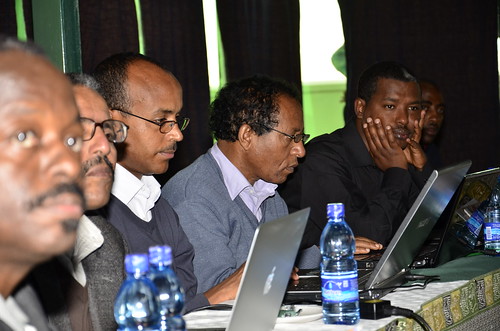| Getting your Trinity Audio player ready... |
Between May and October 2012, the PMO in conjunction with the Technical Advisory Committee (TAC) participated in the monitoring and review of projects to assess progress made during the first year of implementation.

Project consortium members listen attentively during the monitoring and evaluation
meeting at Eldoret on August 2012.(photo credit: ILRI/Albert Mwangi)
This involved listening to technical presentations of all the partnering institutions within a consortium followed by a field visit to view progress of activities on the ground. This first review exercise was an eye opener on the progress made thus far and the challenges encountered.
Some of the lessons learnt are:
(a) Project initiation bottlenecks
The projects have made commendable progress in achieving results during their first year of implementation. However, it was apparent that the Program underestimated the initial project set up period for the consortia that included institutional signing of contractual documents, setting up requisite administrative systems and conduction of first inception and planning meetings. This period varied from 2-4 months depending on the institution and consequently delayed project activities.
(b) Addressing Procurement Challenges at Public Institutions
Procurement of equipment, chemicals, and reagents has proven to be the biggest impediment for timely execution of project activities. The cumbersome and bureaucratic procurement processes at the implementing partner institutions has significantly affected project timelines across the board. This was a common problem in many public institutions in the region where procurement of equipment can take up to six months before delivery. This would not work for short-term projects. In addition, the rate of fund utilization for the first year for projects procuring heavy equipment was below expectation simply because these funds have been tied up in procurement processes.
To address the procurement issue, Bio-Innovate has instituted a system that is geared at circumventing these cumbersome processes. The Program has started making international purchases on behalf of the implementing partner institutions. All the partners need to do is furnish the PMO with an official request, the exact specifications of the items and the name of a credible international supplier. The supplier then invoices the PMO who in turn makes the payment directly on behalf of the partner with the items being shipped directly to the partner institution. Bio-Innovate has also entered into an agreement with Sigma-Aldrich to make bulk purchases of chemicals and reagents and stock them in the region, which will drastically cut down on delivery down time and ensure quality reagents at favorable prices.
(c) Consortium coordination challenges
The multidisciplinary partner arrangement that Bio-Innovate has adopted requires a very dynamic and proactive principal investigator (PI) to coordinate consortium activities effectively. The PMO works closely with the PI who in addition to coordinating the consortium’s activities is required to send consolidated annual reports twice a year on behalf of the consortium partners to the PMO. This is proving to be a challenge to some of the PIs who also have component activities to deliver. The project budget has a coordination budget line, which the PMO is encouraging the PIs to activate to recruit a project coordination staff to assist in the coordination responsibility. In instances where this has been done, results have been evidently better.
(d) Funds disbursement and accountability issues
The Program disbursement system requires that the projects submit activity plans and corresponding budget twice a year for action. Disbursements are only made when the previous funds have been exhaustively retired. With such a varied group of partners with different systems and approaches to financial management, there have been difficulties experienced by the Program in supervising project funds management despite a manual developed and send to the institutions to guide them. The Program has had to train financial managers at the implementing institutions to ensure compliance and further make visits to these institutions during the M&E sessions to provide extra support.


